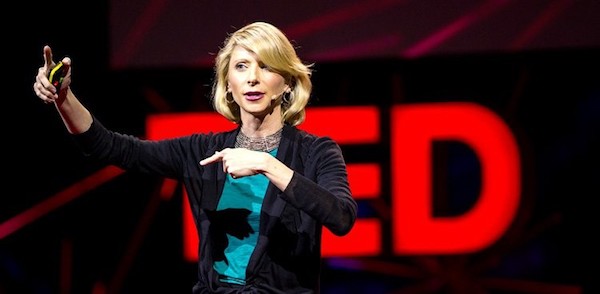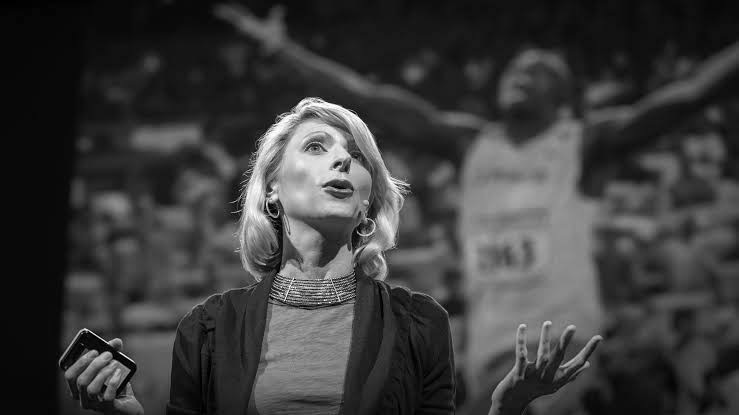ハーバードMBAコースで教鞭を執る社会心理学者エイミー・カディ(Amy Cuddy)のTEDスピーチの英語を徹底解説する。日本語訳なしでも理解できるよう、単語と文法をわかりやすくご説明する。日本語訳ではわからない、エイミー・カディの本当のメッセージを感じて欲しい。
スピーチの題名は「Your body language may shape who you are」(ボディランゲージが人を作る!)(2012年6月収録)だ。エイミーは、自信のない時でも、自信溢れるポーズをとることで自分自身を変えられると語っています。緊張すると力が発揮できないという方におすすめ。
なお、TED Talk でのオリジナルスピーチの画像は「Your body language may shape who you are」で楽しんでほしい。
So I want to start by offering you a free no-tech life hack, and all it requires of you is this: that you change your posture for two minutes. But before I give it away, I want to ask you to right now do a little audit of your body and what you’re doing with your body. So how many of you are sort of making yourselves smaller? Maybe you’re hunching, crossing your legs, maybe wrapping your ankles. Sometimes we hold on to our arms like this. Sometimes we spread out. (Laughter) I see you. So I want you to pay attention to what you’re doing right now. We’re going to come back to that in a few minutes, and I’m hoping that if you learn to tweak this a little bit, it could significantly change the way your life unfolds.
start by …ing: …することで始める
no-tech: テクノロジーではない
hack /hǽk/ (名) 道具 ⇨ “free no-tech life hack”「無料のテクノロジーではない人生の道具」。
all (that) it requires of you is 〜: 代名詞 “all” の後に関係代名詞が省略されており「“that” 以下の全てのこと/もの」の意。 “it requires (目的語) of you” 「それはあなたに(目的語)を要求する」の目的語 (“all”) が関係代名詞とともに前に来ている。全体では「それがあなたに要求する全てのもの・ことは」 の意。
that you (should) change 〜 : “all it requires of you is that you change 〜 ” と言い換えようとしたための “that”。主節の動詞が “require” のため “you” の後に “should” が省略されている。
posture /pɑ́stʃər/ (名) 姿勢
give 〜 away: 〜を与える、提供する
audit /ɔ́ːdit/ (名) 検査 ⇨ “do a little audit of 〜”「〜を少々調べる」。
and (do a little audit of) what you’re doing with your body: “and” の後にカッコ内が省略されている。“what” は先行詞を含む関係代名詞で「〜のこと/もの」。全体では「そして、あなたがあなたの体でしていること(を少々調 べる)」の意。
sort of: (口語)多少、いくらか、幾分、ある程度
hunch /hʌ́n(t)ʃ/ (動)(背などが)丸くなる、猫背になる
cross one’s legs: 脚を組む
wrap /rǽp/ (動) ~を包む
hold on to 〜: ~をつかんで離さない、〜を持ち続ける
spread out:(群動)広げる
tweak /twíːk/ (動)(機能を改善するために)微調整/マイナーチェンジす る
unfold /ʌnfóuld/ (動) 展開する ⇔ “fold” (動) 折りたたむ
So, we’re really fascinated with body language, and we’re particularly interested in other people’s body language. You know, we’re interested in, like, you know — (Laughter) — an awkward interaction, or a smile, or a contemptuous glance, or maybe a very awkward wink, or maybe even something like a handshake.
fascinate /fǽsənèit/ (動)(人)を魅了する ⇨ “be fascinated with 〜”「〜に魅了される」。
like /láik/ (間投) その~、例えば(つなぎ言葉として、会話の中でよく使われる。)
you know: えー、あの…(“like” 同様つなぎ言葉)
awkward /ɔ́ːkwərd/ (形) 不器用な、下手な
interaction /ìntərǽkʃən/ (名) 意思の疎通
contemptuous /kəntémptʃuəs/ (形) 人をばかにした、見下した
something like 〜: ~のようなもの、~の類いのもの
Narrator: Here they are arriving at Number 10. This lucky policeman gets to shake hands with the President of the United States. Here comes the Prime Minister — No. (Laughter) (Applause)
Number 10: イギリスの首相官邸get to 〜: ~できる機会を得るHere comes 〜: ~がやって来た
Amy Cuddy: So a handshake, or the lack of a handshake, can have us talking for weeks and weeks and weeks. Even the BBC and The New York Times. So obviously when we think about nonverbal behavior, or body language — but we call it nonverbals as social scientists — it’s language, so we think about communication. When we think about communication, we think about interactions. So what is your body language communicating to me? What’s mine communicating to you?
have us talking for weeks: “have A 〜ing” 「A を〜させる」。全体では「我々を数週間の話させる」。
(have) Even the BBC and The New York Times (talking for weeks): カッコ内が省略されている。
nonverbal /nɑ́nvə́ːrbl/ (形) 言葉によらない、非言語的な ⇔ “verbal” (形)言葉による
social scientist : 社会科学者
mine: ここでは “my body language” の意。
And there’s a lot of reason to believe that this is a valid way to look at this. So social scientists have spent a lot of time looking at the effects of our body language, or other people’s body language, on judgments. And we make sweeping judgments and inferences from body language. And those judgments can predict really meaningful life outcomes like who we hire or promote, who we ask out on a date. For example, Nalini Ambady, a researcher at Tufts University, shows that when people watch 30-second soundless clips of real physician-patient interactions, their judgments of the physician’s niceness predict whether or not that physician will be sued. So it doesn’t have to do so much with whether or not that physician was incompetent, but do we like that person and how they interacted? Even more dramatic, Alex Todorov at Princeton has shown us that judgments of political candidates‘ faces in just one second predict 70 percent of U.S. Senate and gubernatorial race outcomes, and even, let’s go digital, emoticons used well in online negotiations can lead you to claim more value from that negotiation. If you use them poorly, bad idea. Right?
effects of 〜 on judgments: 〜の “judgment” への効果
sweeping /swíːpiŋ/ (形) 大まかな、包括的な
inference /ínfərəns/ (名) 推測、推定
predict /pridíkt/ (動) ~を予測/予知する
outcome /áutkʌ̀m/ (名) 結果
who we hire or promote, who we ask out on a date: 間接疑問の名詞節。⇨ “life outcomes like who we hire or promote, who we ask out on a date”「誰を雇うかや昇進させるか、誰をデートに誘うかなどの生活上の結果」の意。
ask 〜 out on a date: 〜をデートに誘う
clip /klíp/ (名)(ビデオなどの)カットされた場面、クリップ
physician /fizíʃən/ (名) 医師
niceness /náisnəs/ (名) 親切、気遣い
sue /sjúː/ (動) ~を訴える
have to do with 〜: ~と関係している ⇨ “it doesn’t have to do so much with”「それは〜とそんなに関係していない」の意。
incompetent /inkɑ́mpətənt/ (形) 無能な ⇔ “competent” (形) 有能な
Princeton: = Princeton University
political candidate: 政治家候補
senate /sénət/ (名)(米国議会の)上院
gubernatorial /gùːbərnətɔ́ːriəl/ (形) (州)知事の ⇨ “U.S. Senate and gubernatorial race outcomes”「上院や州知事選挙の結果」の意。
emoticon /əmóutəkɑ̀n/ (名) 顔文字
emoticons used well in online negotiations: ここまでが主語。「オンライン上での交渉で上手に使われる顔文字」の意。
claim /kléim/ (動) ~を獲得する
So when we think of nonverbals, we think of how we judge others, how they judge us and what the outcomes are. We tend to forget, though, the other audience that’s influenced by our nonverbals, and that’s ourselves. We are also influenced by our nonverbals, our thoughts and our feelings and our physiology.
think of 〜: ~のことを考える
how we judge others, how they judge us and what the outcomes are:間接疑問の名詞節。「我々がどのように他人を判断するか、彼らがどのように 我々を判断するか、そして結果がどうなるか」の意。
that’s [is] influenced by 〜: “that” は関係代名詞で先行詞は “the other audience” 。
that’s ourselves: “that” は “the other audience” を示す。
So what nonverbals am I talking about? I’m a social psychologist. I study prejudice, and I teach at a competitive business school, so it was inevitable that I would become interested in power dynamics. I became especially interested in nonverbal expressions of power and dominance.
prejudice /prédʒədəs/ (名) 先入観、偏見
inevitable /inévətəbl/ (形) 避けられない、不可避の
dynamics /dainǽmiks/ (名) 動力学、力学 ⇨ “power dynamics”「権力の力学」の意。
dominance /dɑ́mənəns/ (名) 支配、優勢
And what are nonverbal expressions of power and dominance? Well, this is what they are. So in the animal kingdom, they are about expanding. So you make yourself big, you stretch out, you take up space, you’re basically opening up. It’s about opening up. And this is true across the animal kingdom. It’s not just limited to primates. And humans do the same thing. (Laughter) So they do this both when they have power sort of chronically, and also when they’re feeling powerful in the moment. And this one is especially interesting because it really shows us how universal and old these expressions of power are. This expression, which is known as pride, Jessica Tracy has studied. She shows that people who are born with sight and people who are congenitally blind do this when they win at a physical competition. So when they cross the finish line and they’ve won, it doesn’t matter if they’ve never seen anyone do it. They do this. So the arms up in the V, the chin is slightly lifted.
what they are: “what” は先行詞を含む関係代名詞で「〜のこと/もの」。“they” は “nonverbal expressions of power and dominance” を指す。「それらが何たるかというもの」つまり「それらの正体」の意。
kingdom /kíŋdəm/ (名) ~界
are about expanding: “be about 〜” で「〜が(最も重要な)目的である/のことばかり考えている」の意。ここでは「拡大することが重要である。」 のニュアンス。
take up 〜: (空間などを)占める、取る
open up: 広げる
It’s not just limited to 〜: “be limited to 〜” で「〜に限られている」の意。ここでは “not just” が付いているので、「それは〜だけに限られているわけではない」の部分否定の意味。
primate /práimət/ (名) 霊長類
chronically /krɑ́nikəli/ (副) 慢性的に
both when 〜 and (also) when …: 〜するときと…するときと両方で
sort of: (口語)多少、いくらか、幾分、ある程度
in the moment: その瞬間(時)にthis one: 前文全てを示している。
universal /jùːnəvə́ːrsl/ (形) 普遍的
it really shows us how universal and (how) old these expressions of power are:「“it” が私たちに “how” 以下を示している。」意。“how” 以下は、間接疑問の名詞節。疑問文 “How universal and (how) old are these expressions of power?” を、“are” を最後に置いて名詞節にしている。全体では「それは、本当に、それらの権力の表現がどれくらい普遍的でどれくらい 古いものなのかということを我々に示している。」の意。
born with sight: 目が見える様に生まれた
congenitally /kəndʒénitli/ (副) 生まれついて
it doesn’t matter if 〜: 〜かどうかは関係ない
seen anyone do it: “see (知覚動詞) + (人) + 動詞の原形” で、「(人) が〜することを見る」の意。
つづきは「エイミー・カディの英語❷|ボディランゲージが人を作る!TEDを徹底解説」で楽しんで頂きたい。

『英語独学完全マニュアル』
独学で効率的に習得する科学的学習法の全て(全79ページ)
英語は独学が基本です。しかし、「自分の学習方法が正しいかどうか…」不安に思っていませんか?本書は、英語の学習方法についてお悩みの皆さまに、第二言語習得研究と脳科学(神経科学)研究の知見に基づいた真に効率的な英語学習法をご紹介する解説書です。
無料eBookの主な内容
- 単語・文法・発音の効率的な基礎力強化方法
- インプット(読む・聞く)能力向上のための英語脳作りトレーニング法
- アウトプット(話す・書く)能力向上のためのリハーサル・トレーニング法
- 学習計画の立て方と効率性を上げるための学習習慣
そろそろ本気で英語を習得したいとお考えの方におすすめです。また、「英会話スクールに通っているけど思うように上達しない…」「TOEICで高得点を取ったけど話せない…」などでお悩みの皆さまも是非ご一読ください。



